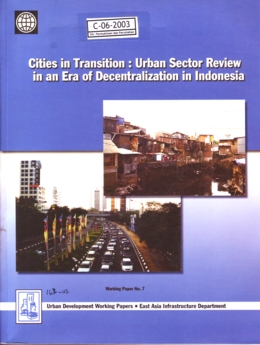|
 Rapid urbanization is straining Indonesia's cities: it is the urban poor who suffer most. Urban services are inadequate to absorb the continuous flow of people into the cities, which were neglected for years and which took a blow in the aftermath of the crisis. Decentralization is providing an opportunity as well as a threat for improving urban services. The policy could enable city managers to tackle issues affecting their citizens, but at the same time, its hasty implementation and incomplete framework could strain cities even further in the short run. For cities to be able to face the challenges of the present and the potential of the future, the central government must complete the unfinished agenda of decentralization that will enable local governments to fully assume their new responsibilities, while the cities must strive to meet rising local aspirations by improving urban services, reducing urban poverty and promoting local economic development. Table of Contents: Foreword Acknowledgements Preface Executive Summary Chapter I: The Setting for Change Background Recent Developments Decentralization: The “Big Bang” Chapter II: Decentralization and Local Governance Introduction Decentralization: The Policy and Regulatory Framework Institutional Framework Governing Urban Affairs Local Government Financing Changing the Face of Urban Local Governance Chapter III: Urbanization: Rising Pressures, Uncertain Responses Addressing Urban Poverty in Indonesia Urban Land and Housing Provision of Urban Services Local Economic Development Urban Environmental Issues Chapter IV: Review of Urban Sector Operations Overview of Past Development Assistance The Story of Two Programs Overall Lessons Learned A New Paradigm of Urban Lending: UPP and USDRP Chapter V: Frameworks for Sustainable Urban Growth in Indonesia Government of Indonesia's Urban Development Policy Guiding Principles and Approach Response to the Challenge: Further Change in Cities Outlook: Cautious Optimism Post Date : 25 Juni 2010 |